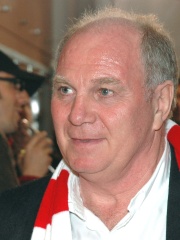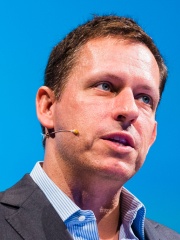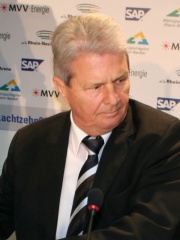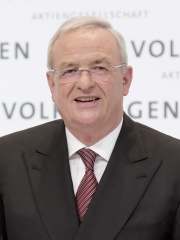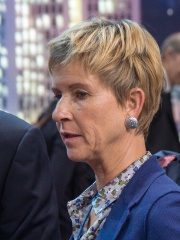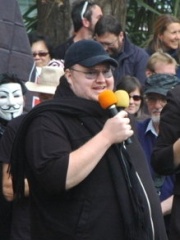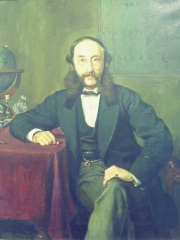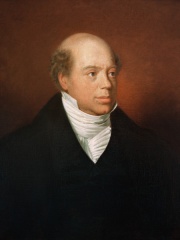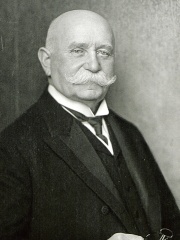
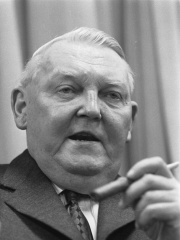
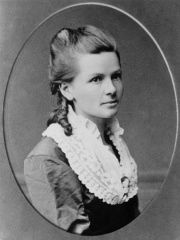
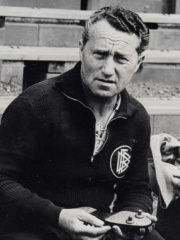
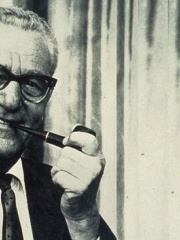
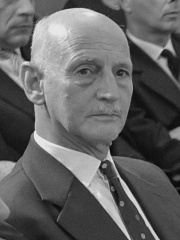
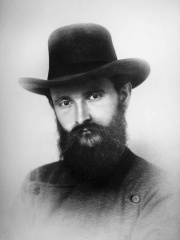
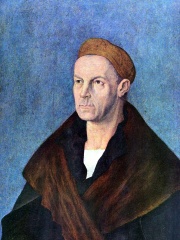
The Most Famous
BUSINESSPEOPLE from Germany
This page contains a list of the greatest German Businesspeople. The pantheon dataset contains 847 Businesspeople, 60 of which were born in Germany. This makes Germany the birth place of the 3rd most number of Businesspeople behind United States, and United Kingdom.
Top 10
The following people are considered by Pantheon to be the top 10 most legendary German Businesspeople of all time. This list of famous German Businesspeople is sorted by HPI (Historical Popularity Index), a metric that aggregates information on a biography's online popularity. Visit the rankings page to view the entire list of German Businesspeople.

1. Ferdinand von Zeppelin (1838 - 1917)
With an HPI of 75.74, Ferdinand von Zeppelin is the most famous German Businessperson. His biography has been translated into 54 different languages on wikipedia.
Count Ferdinand von Zeppelin (German: Ferdinand Adolf Heinrich August Graf von Zeppelin; 8 July 1838 – 8 March 1917) was a German general and later inventor of the Zeppelin rigid airships. His name became synonymous with airships and dominated long-distance flight until the 1930s. He founded the company Luftschiffbau Zeppelin.

2. Ludwig Erhard (1897 - 1977)
With an HPI of 75.70, Ludwig Erhard is the 2nd most famous German Businessperson. His biography has been translated into 75 different languages.
Ludwig Wilhelm Erhard (German: [ˈluːtvɪç ˈʔeːɐ̯haʁt]; 4 February 1897 – 5 May 1977) was a German politician and economist who served as the second chancellor of West Germany from 1963 until 1966. Affiliated with the Christian Democratic Union (CDU), he is known for leading the West German postwar economic reforms and economic recovery (Wirtschaftswunder, German for "economic miracle") in his role as Minister of Economic Affairs under Chancellor Konrad Adenauer from 1949 to 1963. During that period he promoted the concept of the social market economy (soziale Marktwirtschaft), on which Germany's economic policy in the 21st century continues to be based. In his tenure as Chancellor, however, Erhard lacked support from Adenauer, who remained chairman of the CDU party until 1966. Erhard failed to win the German public's confidence in his handling of a budget deficit and lacked public support for his direction of foreign policy. His popularity waned, and he resigned his chancellorship on 30 November 1966.

3. Bertha Benz (1849 - 1944)
With an HPI of 74.67, Bertha Benz is the 3rd most famous German Businessperson. Her biography has been translated into 43 different languages.
Bertha Benz (German: [ˈbɛʁta ˈbɛnts] ; née Cäcilie Bertha Ringer; 3 May 1849 – 5 May 1944) was a German automotive pioneer. She was the business partner, investor and wife of automobile inventor Carl Benz. On 5 August 1888, she was the first person to drive an internal-combustion-engined automobile over a long distance, field testing the Benz Patent-Motorwagen, inventing brake lining and solving several practical issues during the journey of 105 km (65 miles). In doing so, she brought the Patent-Motorwagen worldwide attention and got their company its first sales. Bertha Benz was not allowed to study in the Grand Duchy of Baden, and her financial and practical engineering contributions have long been overlooked until the 21st century.

4. Adolf Dassler (1900 - 1978)
With an HPI of 73.95, Adolf Dassler is the 4th most famous German Businessperson. His biography has been translated into 47 different languages.
Adolf "Adi" Dassler (3 November 1900 – 6 September 1978) was a German cobbler, inventor, and businessman who founded the sportswear company Adidas. He was the younger brother of Puma founder, Rudolf Dassler. The brothers were partners in a shoe company Adolf started, Gebrüder Dassler Schuhfabrik ("Dassler Brothers Shoe Factory"). Rudolf joined in 1924. However, after a feud developed between them following World War II, the brothers went separate ways and started their respective companies in 1948. Dassler was an innovator in sports shoe design and one of the early promoters who obtained endorsements from athletes to drive sales of his products. From his concepts, he created Adidas, which had 17 factories and annual sales of one billion Deutschmarks at the time of his death.
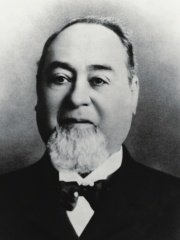
5. Levi Strauss (1829 - 1902)
With an HPI of 73.15, Levi Strauss is the 5th most famous German Businessperson. His biography has been translated into 51 different languages.
Levi Strauss ( LEE-vy STROWSS; born Löb Strauß, German: [løːp ˈʃtʁaʊs]; February 26, 1829 – September 26, 1902) was a German-born American businessman who founded the first company to manufacture blue jeans. His firm of Levi Strauss & Co. (Levi's) began in 1853 in San Francisco, California.

6. Rudolf Dassler (1898 - 1974)
With an HPI of 72.33, Rudolf Dassler is the 6th most famous German Businessperson. His biography has been translated into 40 different languages.
Rudolf "Rudi" Dassler (29 April 1898 – 27 October 1974) was a German cobbler, inventor and businessman who founded the sportswear company Puma. He was the older brother of Adidas founder, Adolf "Adi" Dassler. The brothers were partners in a shoe company Adolf started, Gebrüder Dassler Schuhfabrik ("Dassler Brothers Shoe Factory"). Rudolf joined in 1924. However, after a feud developed between them following World War II, the brothers went separate ways and started their respective companies in 1948. Initially calling the new company "Ruda" (a portmanteau for Rudolf Dassler), it was soon changed to its present name of Puma. Puma is the Quechua word for cougar; from there, it went into German as well as other languages.

7. Otto Frank (1889 - 1980)
With an HPI of 71.85, Otto Frank is the 7th most famous German Businessperson. His biography has been translated into 33 different languages.
Otto Heinrich Frank (12 May 1889 – 19 August 1980) was a German businessman, and the father of Anne Frank. He edited and published the first edition of her diary in 1947 (subsequently known in English as The Diary of a Young Girl) and advised on its later theatrical and cinematic adaptations. In the 1950s and the 1960s, he established European charities in his daughter's name and founded the trust which preserved his family's wartime hiding place, the Anne Frank House, in Amsterdam.

8. Robert Bosch (1861 - 1942)
With an HPI of 71.84, Robert Bosch is the 8th most famous German Businessperson. His biography has been translated into 45 different languages.
Robert Bosch (23 September 1861 – 12 March 1942) was a German business magnate, engineer and inventor. He was the founder of Bosch.

9. Jakob Fugger (1459 - 1525)
With an HPI of 71.69, Jakob Fugger is the 9th most famous German Businessperson. His biography has been translated into 34 different languages.
Jakob Fugger of the Lily (German: Jakob Fugger von der Lilie; 6 March 1459 – 30 December 1525), also known as Jakob Fugger the Rich or sometimes Jakob II, was a major German merchant, mining entrepreneur, and banker. He was a descendant of the Fugger merchant family located in the Free Imperial City of Augsburg. He was born and later also elevated through marriage to Grand Burgher of Augsburg (Großbürger zu Augsburg). Within a few decades, he expanded the family firm to a business operating in all of Europe. He began his education at the age of 14 in Venice, which also remained his main residence until 1487. At the same time, he was a cleric and held several prebends. American journalist Greg Steinmetz has estimated his overall wealth to be around $400 billion adjusted to 2015, equivalent to 2% of the GDP of Europe at that time. The foundation of the family's wealth was created mainly by the textile trade with Italy. The company grew rapidly after the brothers Ulrich, Georg and Jakob began banking transactions with the House of Habsburg as well as the Roman Curia, and at the same time began mining operations in Tyrol, and from 1493 on the extraction of silver, and copper in the kingdoms of Bohemia and Hungary. As of 1525, they also had the right to mine quicksilver and cinnabar in Almadén. After 1487, Jakob Fugger was the de facto head of the Fugger business operations which soon had an almost monopolistic hold on the European copper market. Copper from Hungary was transported through Antwerp to Lisbon, and from there shipped to India. Jakob Fugger also contributed to the first and only trade expedition to India that German merchants cooperated in, a Portuguese fleet to the Indian west coast (1505–1506), as well as a failed 1525 Spanish trade expedition to the Maluku Islands. With his support of the Habsburg dynasty as a banker, he had a decisive influence on European politics at the time. He financed the rise of Maximilian I and made considerable contributions to secure the election of the Spanish king Charles I to become Holy Roman Emperor Charles V. Jakob Fugger also funded the marriages which later resulted in the House of Habsburg gaining the kingdoms of Bohemia and Hungary. Jakob Fugger secured his legacy and lasting fame through his foundations in Augsburg. A chapel funded by him and built from 1509 to 1512 is Germany's first renaissance building and contains the tombs of the brothers Ulrich, Georg and Jakob. The Fuggerei which was founded by Jakob in 1521 is the world's oldest social housing complex still in use. The Damenhof, part of the Fuggerhäuser in Augsburg, is the first secular renaissance building in Germany and was built in 1515. At his death on 30 December 1525, Jakob Fugger bequeathed to his nephew Anton Fugger company assets totaling 2,032,652 guilders. He is among the most well-known Germans and arguably the most famous citizen of Augsburg, with his wealth earning him the moniker "Fugger the Rich". In 1967 a bust of him was placed in the Walhalla, a "hall of fame" near Regensburg that honors laudable and distinguished Germans.
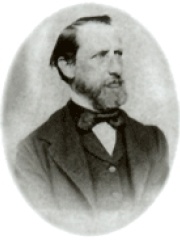
10. Henri Nestlé (1814 - 1890)
With an HPI of 71.27, Henri Nestlé is the 10th most famous German Businessperson. His biography has been translated into 36 different languages.
Henri Nestlé (French pronunciation: [ɑ̃ʁi nɛsle]; born Heinrich Nestle, German: [ˈhaɪnrɪç ˈnɛstlə]; 10 August 1814 – 7 July 1890) was a German-born Swiss confectioner and the founder of Nestlé, the world's largest food and beverage company.
People
Pantheon has 60 people classified as German businesspeople born between 1459 and 1986. Of these 60, 11 (18.33%) of them are still alive today. The most famous living German businesspeople include Uli Hoeneß, Peter Thiel, and Dieter Schwarz. The most famous deceased German businesspeople include Ferdinand von Zeppelin, Ludwig Erhard, and Bertha Benz. As of April 2024, 1 new German businesspeople have been added to Pantheon including Erica Baker.
Living German Businesspeople
Go to all RankingsUli Hoeneß
1952 - Present
HPI: 67.71
Peter Thiel
1967 - Present
HPI: 64.64
Dieter Schwarz
1939 - Present
HPI: 63.70
Herbert Hainer
1954 - Present
HPI: 62.43
Dietmar Hopp
1940 - Present
HPI: 61.70
Jawed Karim
1979 - Present
HPI: 61.47
Martin Winterkorn
1947 - Present
HPI: 60.74
Susanne Klatten
1962 - Present
HPI: 58.44
Katerina Tikhonova
1986 - Present
HPI: 53.87
Kim Dotcom
1974 - Present
HPI: 53.52
Erica Baker
HPI: 31.69
Deceased German Businesspeople
Go to all RankingsFerdinand von Zeppelin
1838 - 1917
HPI: 75.74
Ludwig Erhard
1897 - 1977
HPI: 75.70
Bertha Benz
1849 - 1944
HPI: 74.67
Adolf Dassler
1900 - 1978
HPI: 73.95
Levi Strauss
1829 - 1902
HPI: 73.15
Rudolf Dassler
1898 - 1974
HPI: 72.33
Otto Frank
1889 - 1980
HPI: 71.85
Robert Bosch
1861 - 1942
HPI: 71.84
Jakob Fugger
1459 - 1525
HPI: 71.69
Henri Nestlé
1814 - 1890
HPI: 71.27
Paul Reuter
1816 - 1899
HPI: 69.70
Nathan Mayer Rothschild
1777 - 1836
HPI: 68.18
Newly Added German Businesspeople (2025)
Go to all RankingsOverlapping Lives
Which Businesspeople were alive at the same time? This visualization shows the lifespans of the 25 most globally memorable Businesspeople since 1700.

